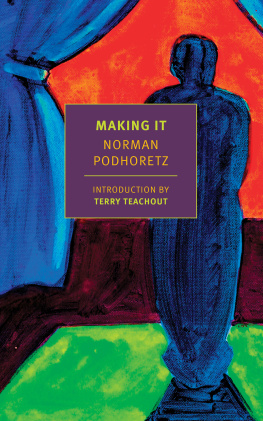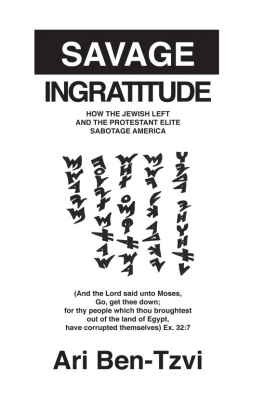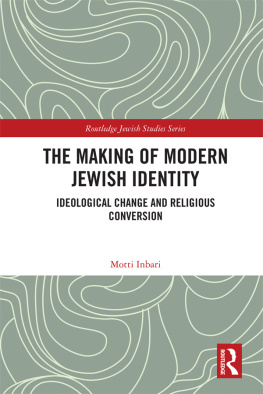MAKING IT
NORMAN PODHORETZ
Introduction by
TERRY TEACHOUT
NEW YORK REVIEW BOOKS

New York
NORMAN PODHORETZ is an author, editor, and political and cultural critic. He was the editor of Commentary from 1960 to 1995 and has written twelve books, including World War IV, The Prophets, Ex-Friends, and most recently Why Are Jews Liberals? He was awarded the Presidential Medal of Freedom in 2004.
TERRY TEACHOUT is the drama critic for The Wall Street Journal and the critic-at-large for Commentary. He has written biographies of Louis Armstrong, George Balanchine, Duke Ellington, and H. L. Mencken; the libretti for three operas by Paul Moravec; and a play, Satchmo at the Waldorf, that has been produced off-Broadway and throughout America.
ACKNOWLEDGMENTS
I AM IMMEASURABLY grateful to Elizabeth Ames and the Yaddo Corporation for the hospitality they offered me while I was working on this book. I am also grateful for the hospitality offered me at an earlier stage by Paul Horgan and the Fellows of the Center for Advanced Studies at Wesleyan University.
I wish, finally, to acknowledge my immense debt to Lionel Trilling, who has taught me more than he or I ever realizedthough not, I fear, precisely what he would have wanted me to learn.
PREFACE
L ET ME introduce myself. I am a man who at the precocious age of thirty-five experienced an astonishing revelation: it is better to be a success than a failure. Having been penetrated by this great truth concerning the nature of things, my mind was now open for the first time to a series of corollary perceptions, each one as dizzying in its impact as the Original Revelation itself. Money, I now saw (no one, of course, had ever seen it before), was important: it was better to be rich than to be poor. Power, I now saw (moving on to higher subtleties), was desirable: it was better to give orders than to take them. Fame, I now saw (how courageous of me not to flinch), was unqualifiedly delicious: it was better to be recognized than to be anonymous.
This book represents an effort to explain why it should have taken someone like myself so long to arrive at such apparently elementary discoveries. It is not, in other words, a success story, it is the story of an education; and while it is autobiographical in form, it is not an autobiography in the usual sense, being confined very strictly to those details of my life bearing on the question of career.
To be sure, the story I tell here resembles the traditional success story in tracing the progressive rise of a young man up from poverty and obscure origins. In contrast to the traditional success story, however, its purpose is not to celebrate that rise, but rather to describe certain fine-print conditions that are attached to the successful accomplishment of what the sociologists call upward mobility in so heterogeneous a society as our own. There are prices to be paid for the rewards of making it in America, some obvious, some not very well advertised. I try in this book to focus attention on a few of the latter, which are grouped together into the metaphor of conversions.
My second purpose in telling the story of my own career is to provide a concrete setting for a diagnosis of the curiously contradictory feelings our culture instills in us toward the ambition for success, and toward each of its various goals: money, power, fame, and social position. On the one hand, we are commanded to become successfulthat is, to acquire more of these worldly goods than we began with, and to do so by our own exertions; on the other hand, it is impressed upon us by means both direct and devious that if we obey the commandment, we shall find ourselves falling victim to the radical corruption of spirit which, given the nature of what is nowadays called the system, the pursuit of success requires and which its attainment always bespeaks. On the one hand, the exclusive worship of the bitch-goddess SUCCESS, as William James put it in a famous remark, is our national disease; on the other hand, a contempt for success is the consensus of the national literature for the past hundred years and more. On the one hand, our culture teaches us to shape our lives in accordance with the hunger for worldly things; on the other hand, it spitefully contrives to make us ashamed of the presence of those hungers in ourselves and to deprive us as far as possible of any pleasure in their satisfaction.
Nothing, I believe, defines the spiritual character of American life more saliently than this contradiction, and I doubt that many Americans, whether they be successes or failures in their careers, can have escaped its consequences. I myself have tasted enough success of one kind or another to know something about success, and more than enough ambition of every kind to know much of what there is to know about ambition. But these are not the credentials I offer for presuming to write an autobiographical book about the problem of success in America. My claim to expertise in this field is simply that I am an American. The fact that I was also born in Brooklyn to East European Jewish parents and that I have made my career in the wilds of literary New York does not, I think, disqualify the story of that career from being considered typical in its underlying contours. On the contrary, my background and my working life have, if anything, conspired to render me unusually susceptible to the suasions of both sides of the contradictory American attitude toward the ambition for and the pursuit of worldly success.
The immigrant Jewish milieu from which I derive is by now fixed for all time in the American imagination as having been driven by an uninhibited hunger for success. This reputation is by no means as justified as we have been led to believe, but certainly on the surface the gospel of success did reign supreme in the world of my childhood. Success did not necessarily, or even primarily, mean money; just as often it might mean prestige or popularity. In any case, the concept always referred, as it was originally intended to do, to the possession of goods which had value in the eyes of others. These goods might also have had value in ones own eyes, but that was a secondary consideration, if indeed it was ever considered at all. The main thing was to be esteemed, and one would no more have questioned the desirability of so pleasant an estate in life than one would have wondered about the relative merits of illness and good health.
Having grown up with such feelings, I responded with puzzlement to the discovery first forced upon me in college that something which might be called a gospel of anti-success, or even a cult of failure, held as powerful a sway over the spoken attitudes, if not always the behavior, of educated Americans as the opposing creed did over the minds of the people I had previously known. Most of the books I read about America assured meand continue to do so to this daythat success was the supreme, even the only, American value, and yet at Columbia College the word successful glided automatically into the judgment corrupt. The books all said that Americans regarded ambition as a major virtue, and yet a system of manners existed at Columbia which prohibited any expression of worldly ambitiousness. To yearn for the applause of posterity may have been legitimate, but it was thought contemptible to dream of the rewards contemporary society had to offer, and altogether despicable to admit to so low a hunger, except in tones of irony that revealed ones consciousness of how naughty a thing one was doing.







